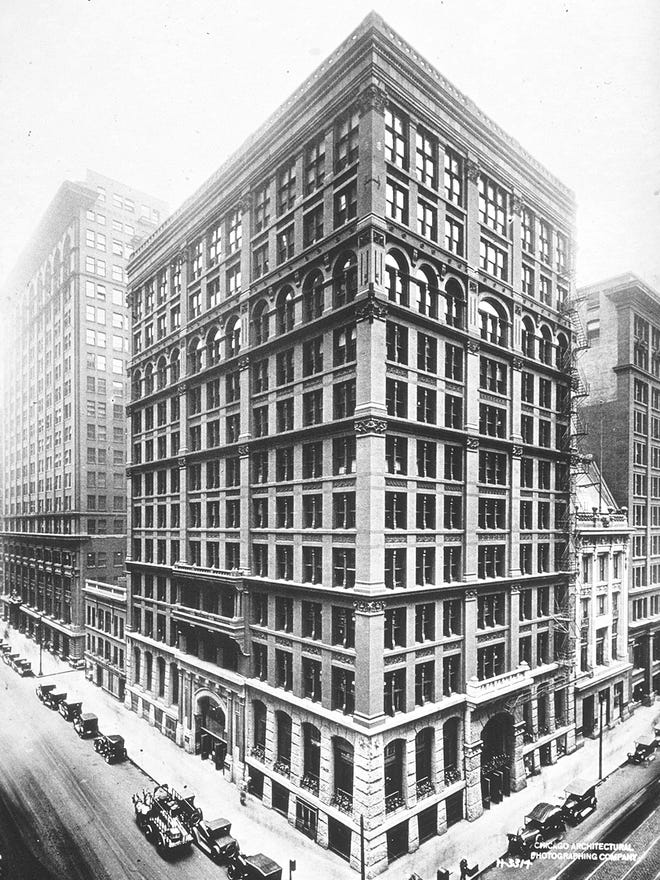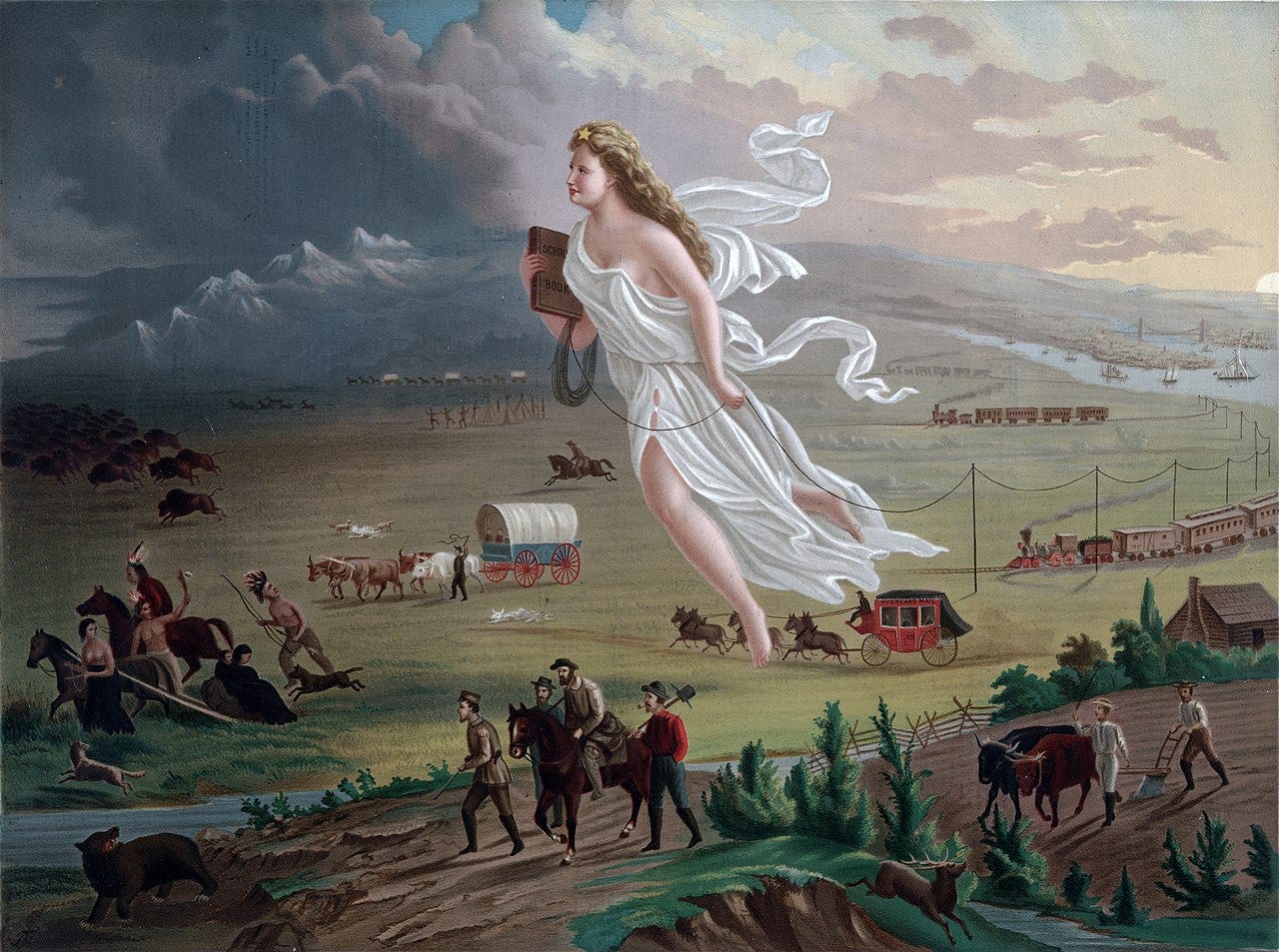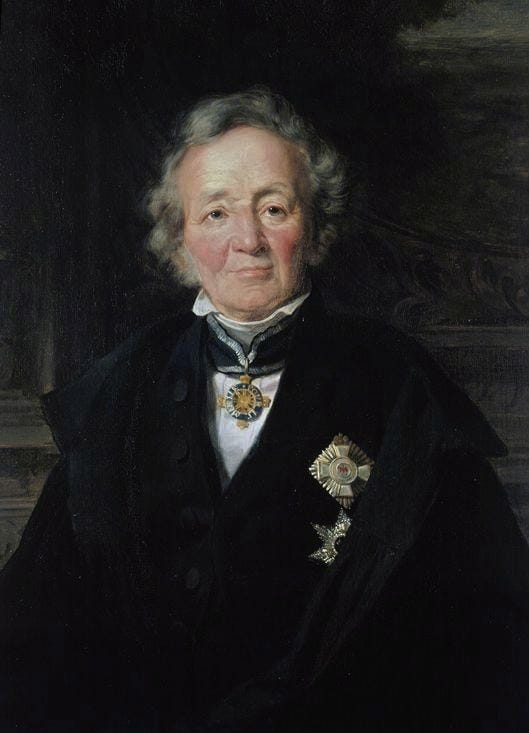Whigs and Marxists: On Teleology and Laws of History
Science envy, belief in progress, and disillusionment - why historians get skittish when talking about general laws of history
After a couple of weeks spent gawking at Nero and his legacy, it’s time to get back to building out a framework for studying and thinking about the past. So far, we’ve said that the past creates the present, that studying the past requires re-enacting it, that interpreting the past requires a map, and that we must be dispassionate observers of the past before we can answer pressing questions about the present.
So, when it comes to observing the past, are there any helpful rules of thumb to look for, or laws of history that events follow? In a future series of posts, I’ll lay out a number of heuristics and “things to remember” about the past that I think are underappreciated by the general public, but can we come up with something more ironclad than a rule of thumb? Are there any theories about history that rise to the level of “laws?”
It turns out, many historians get rather skittish if you start talking about “laws of history,” almost as if the topic brings up some bad memories. This post will very roughly sketch out some of the history of those bad memories. Next week, we’ll try to figure out how to reconcile broad trends and forces in history, with the fact that seemingly random and contingent variables can change the course of history on a dime.
“Science Envy” and belief in Progress -
The late 19th century was a heady time. The industrial revolution seemed to demonstrate that humans had dramatically transformed society and could reshape and master nature itself. Skyscrapers thrust upwards, rail lines bound continents, and steam engines defeated distance. The dominance of European empires vastly outstripped all other historical conquests, and demonstrated how far Europe and North America stood above the rest of the world.

In the glow of the newfangled electric lightbulb that illuminated this new world, Science was quick to receive much of the credit. Francis Bacon seemed to have finally made good on his claim that a new logic of empirical reasoning could unlock great advancements, and Newtonian Physics seemed to have a fundamental rulebook for that novum organon. Likewise, the Enlightenment claimed to have created a new society based on reason and the rule (that word again) of law. And then, along came Charles Darwin, offering the keys to understanding human evolution, and the rules of life itself (even before Darwin published his Origins, the famous Crystal Palace exhibition of Richard Owens’ dinosaurs portrayed the prehistoric creatures as slow and dull-witted). The new Word was Progress, and Science was its prophet.

Other disciplines eagerly jumped on the bandwagon. Psychology hoped to unlock the rules of the mind, and a slew of disciplines and scholars laid the groundwork for what would eventually become “the social sciences.” The term “social engineering” is usually a pejorative today, but it was originally used in earnest during the progressive era in the hope that human society could be efficiently engineered with as much success as any other industry. Much of this optimism seems either simply naïve or dangerously hubristic today, but at the time, science and progress seemed to be on a hot streak, and history was no exception.
It’s not an accident that historians and historical narratives of change and development were common amongst early American progressives, and obviously, the very notion of social progress implies historical change. Frederick Jackson Turner’s Frontier Thesis and Charles Beard’s reframing of the American Founding are prominent examples, but Herbert Crowly, John Dewey, and of course Woodrow Wilson himself all saw progressivism as moving society and its institutions forward in historical terms.

Teleological History -
Narratives of historical progress could be found in 19th century accounts of the rise of the nation state, even before history became “scientized.” In England, professional history emerged haphazardly out of a combination of liberal arts disciplines, and many of the greatest English historians of the era, from Gibbon, to Carlyle, to Macaulay, all had a decided literary bent. While much of their historical methods seem antiquated today, their prose remains glorious. Thomas Babington Macaulay headed up a generation of historians who charted the rise and development of Great Britain into the modern world, and who read the roots of Britain’s liberty, prosperity, and pre-eminence back into the ancient past. Collectively, these historians and their narratives have been labeled as “Whig History,” given their positive portrayal of the victory of the British Whig party and Parliament against the Tories and Crown in early modern England. Historians such as William Stubbs narrated a history of Parliament vs Crown all the way back into the Anglo-Saxon period.
On the other side of the continent, however, the Germans were getting serious, and empirical. Arguably the greatest German Historian of all time was Leopold von Ranke, a titanic figure whose career spanned six decades, and whose collected works fill 54 volumes. Von Ranke was apparently a rather terrible lecturer who was barely audible in the lecture hall, but he trained several generations of devoted students, and his disciples ended up heavily influencing the rise of American academic history. Ranke famously preached the strictest possible adherence to primary sources, and asserted that history should be told as closely as possible to “the way it happened.” Ranke’s devout faith in objectivity, and his empiricism and perfectionism reflected a noble ideal that echoes straight back to Thucydides and Tacitus, yet was pushed to a degree that sounds all so stereotypically German. Also, as Colin Wells in A Brief History of History points out, so much of Ranke’s work on early modern Europe betrayed a fundamental prior assumption that the modern German state was the correct historical outcome, and that “the state” was the highest possible social ideal. Says Wells, “In Ranke’s famous phrase, states were ideas in the mind of God."1 For Macaulay and the other so-called Whig Historians, and Ranke and the German nationalists, their historical narratives were so strong because they seemed to have such a clear end point; and it was hard not to tell their stories with the end in mind right from the start.

But even Ranke’s faith (and in every account I read of him, Ranke’s personally deep piety as a Lutheran seems to have been something of a check on his idealism) pales in comparison to Hegel and the Marxists. More than anyone else, Hegel and Marx laid out theories of “Capital H” History; rules for human society and history that could be interpreted and predicted. For Hegel, great historical individuals and events helped drive history forward in stages of unfolding freedom. Marx kept much of the Hegelian framework, and swapped in the relevant variables for the social classes and the historical progression from slave, to feudal, to capitalist, and then communist society. Many early communists were so devout and sure of themselves and their causes in no small part due to this deeply held belief that they were living out a law of history as fundamental as Newton’s laws of physics.
All three of these schools of history can be loosely grouped together as being (to varying degrees) teleological theories of history, where a posited or desired end result becomes the control variable for interpreting the rest of the narrative. To Macaulay and the Whigs, the end result of British liberty and Parliament seemed so good as to be practically foreordained (William Stubbs happened to be an Anglican bishop), and their great skill in storytelling lent well to dramatic moments that foreshadowed the eventual conclusion. For the German nationalists, suffering from the inferiority complex of being outshined by France for so long (and then dominated by Napoleon), the goal of realizing a political State in which to house the previous spirit of der volk became a veritable Holy Grail. And for Hegel and Marx, the history was really subservient to the theory all along.
I should take care to note that I suspect that this teleological belief in Progress and Science was probably applied more broadly and with less understanding by the general public in the late 19th century, and that many of the very academics associated with these ideas were likely to point out lots of caveats and qualifiers on their ideas. Something similar happened with how Darwinism was applied outside of stricter scientific circles. As science teachers have remarked to me, “Social Darwinism” was more of a pop-intellectual idea than a serious proposal from the best biologists. And even Marxism had its qualifiers, such as Leninism’s clever rejoinder about colonial imperialism delaying Marx’s timetable, and the need to conjure up a Revolutionary Vanguard to hurry up History. Still, Marx’s ideas lent themselves well to being boiled down into just-plausible enough axioms for the type of activist who doesn’t want to let nuance get in the way of a good enemy.
I should also point out that accounts of the late 19th century don’t always read as so confident and optimistic in the moment, and were full of the same sorts of fears and anxieties about social collapse as we see today. Large trends often coexist with contrasting events and movements.
The end of the world -
One of my pet hunches is that we generally continue to underrate the First World War and how cataclysmic it was. The obvious horror and destruction of massed artillery, machine guns, barbed wire, and the trenches are all with us quite vividly, but it can be hard to reconstruct and imagine how the world looked, felt, and thought before that (a book I once started and hope to someday finish is Barbara Tuchman’s The Proud Tower, which both shows the ruling elite at their pinnacle, and gives a sense of the instability and upheaval that was already brewing in Europe and America before the war). Contemporary theories abound regarding European malaise and loss of cultural self-confidence, and I think the extended hang-over from the two most destructive wars in history somehow is often overlooked.

The loss of certainty and confidence from such pointless destruction, wrought by the very fruits of supposed scientific progress, shook pretty much everyone except the Marxists, and helped create or accelerate radical breaks with the past in all sorts of disciplines and artistic fields (le Corbusier’s famous Villa Savoye house is almost a hundred years old, and yet it has more in common with some ultra “modern” houses than neoclassical architecture built just before the War).


History was duly chastened (except for the Marxists, who reached the height of their academic influence later on in the century). Historians and historical narratives had been at the forefront of cheering on the future and talking up the promises of Progress, and deserved their fair share of blame for this hubris. Even the conservative opponents of progressivism couldn’t escape the blast radius, because they had grounded their case for the ancient greatness of Western Civilization in something that had been shattered and sundered by the War also.
Overall, history as a discipline during the 20th century shifted against teleological views of history, and while some liberal strains of progressive history retained their triumphal tones for a while (until swept away by 1960’s counterculture and the New Left), most historians have become much more cautious and restrained in how far to push their implications, and very leery of anything that smacks of triumphalism. Even the Marxists have finally caught up to this (you can find plenty of historians who use Marx as an interpretive lens, but very few old die-hards who still believe that the Revolution is just around the bend).
Every now and then, new developments in science (often around the ability to process and analyze data) will lead to attempts to revive a hard-science study of history that can derive general laws. The field of “psychohistory” attempted to use the science of psychology to explain historical individuals, and a more recent example is Cliodynamics, popularized by Peter Turchin (here’s a Slate Star Codex review of Turchin’s well-known book Secular Cycles, and a big profile of Turchin in The Atlantic). For a rejoinder to Cliodynamics, here’s a mini-essay at historian Bret Devereaux’s excellent blog.
This gets us through a rough account of how and why history has moved away from teleology and triumphalism, but it doesn’t really prove the case that one shouldn’t inject teleology into history, or try to derive general laws from history. After all, isn’t it possible that there are general laws still out there, and we just haven’t found them yet?
Next week, we’ll look at the interplay between great trends and forces in history, along with the contingency of individual agents and events (I promise, it’s more interesting than it might sound).
Colin Wells, A Brief History of History, pg. 233


